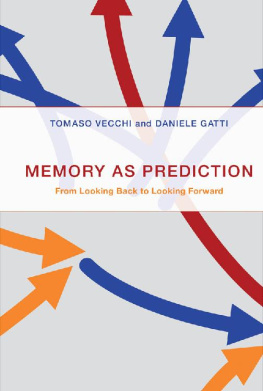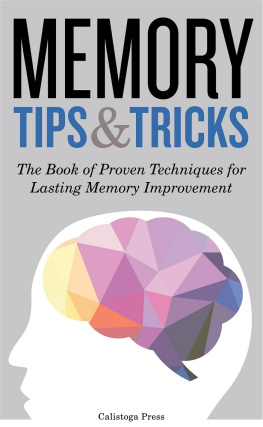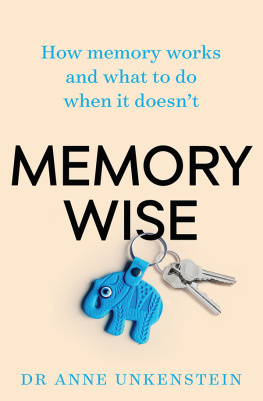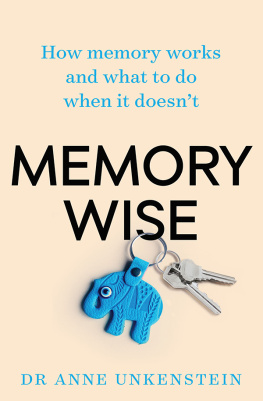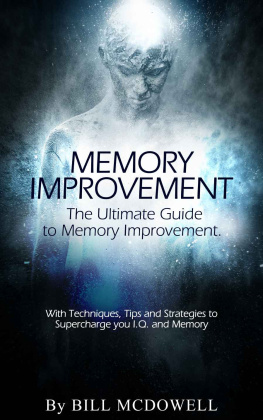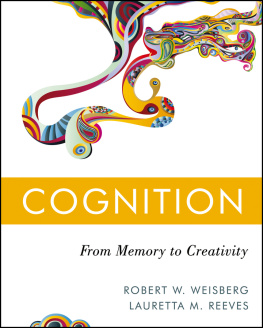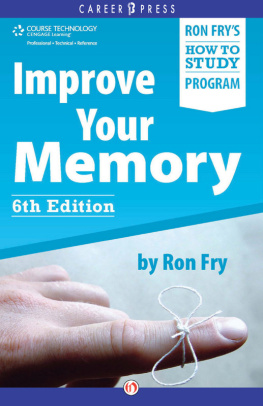
Memory as Prediction
Memory as Prediction
From Looking Back to Looking Forward
Tomaso Vecchi and Daniele Gatti
The MIT Press
Cambridge, Massachusetts
London, England
2020 Massachusetts Institute of Technology
All rights reserved. No part of this book may be reproduced in any form by any electronic or mechanical means (including photocopying, recording, or information storage and retrieval) without permission in writing from the publisher.
Library of Congress Cataloging-in-Publication Data
Names: Vecchi, Tomaso, 1966 author. | Gatti, Daniele, author.
Title: Memory as prediction : from looking back to looking forward / Tomaso Vecchi and Daniele Gatti.
Description: Cambridge, Massachusetts : The MIT Press, [2020] | Includes bibliographical references and index.
Identifiers: LCCN 2020002960 | ISBN 9780262044752 (hardcover)
Subjects: LCSH: Memory. | Forecasting.
Classification: LCC BF371 .V43 2020 | DDC 153.1/2dc23
LC record available at https://lccn.loc.gov/2020002960
d_r0
The first notion to get rid of is that memory is primarily or literally reduplicative, or reproductive. In a world of constantly changing environment, literal recall is extraordinarily unimportant.... Memory appears to be an affair of construction rather than reproduction.
Frederic Bartlett
Contents
Father: For the sake of your life, keep always in mind the three Ps: Prevent, Predict, Provide. Son: So, father, how can I do so? Should I guess about the future? This conversation, representing one of the many words of wisdom that parents may offer to their children, took place between one of the authors and his father. The boundary between guessing and predicting may be thin and invisible as well as large and insuperable. What makes the difference is experience. A child does not appreciate experience, whereas an old man cannot but start from there, predicting the future based on the past.
This book is about memory and experience, about how experience is part of our memories and contributes to our adaptation to the environment. We dedicate this book to our past, our parents and their wisdom; to our present, Luisa and Marta; and to our future, Bianca and Giulio. Past, present, and future are also the essence of friendship: the nonnonovanta community; the colleagues at the University of Pavia, at the Mondino Foundation, and at the IUSS; and all the people who contributed to our long-lasting interest in human memory: Zaira Cattaneo, Elena Cavallini, Cesare Cornoldi, Serena Lecce, Lotfi Merabet, Paola Palladino, Pietro Pietrini, and Emiliano Ricciardi. A special thanks to Floris van Vugt and to all the young friends and collaborators who contributed to the shaping of our thoughts: Mara Bellati, Sara Bottiroli, Letizia Casiraghi, Andrea Ciricugno, Luca Faravelli, Chiara Ferrari, Edoardo Mellia, Luca Rinaldi, Alessia Rosi, and Martine Vallarino. Part of the ideas of this book arose from several conversations with Egidio DAngelo and his group studying the neurophysiology of the cerebellum. Working in a multidisciplinary department, with neurologists and psychiatrists, neurophysiologists and psychologists, statisticians and neuroscientists, offers an exceptionally stimulating atmosphere: we thank all of you.
What is memory? What is memory for? Where is memory in the brain? Although memory is probably the most studied function in cognition, answering these fundamental questions remains a challenge. Memory can be defined as the ability to retrieve information, but this definition does not account either for the fact that this information is continuously changed, modified, or for the lack of a precise correspondence between what is originally encoded and what is later retrieved. We can try to answer the question of what memory is for by defining the function of memory as remembering the past. However, this definition is not consistent with the many errors that characterize our memory as well as with the phylogenetic and ontogenetic origin of memory. Do we really need to remember the past? What is experience for?
The cognitive interest in memory is rooted in the Platonic and Aristotelian teachings and has been maintained throughout the entire history of philosophy, blossoming with the advent of experimental psychology between the late 1800s and early 1900s (for a review see Yates, 1966). Attention to memory has been branching out to various domains such as neurobiology, artificial intelligence, and, more recently, neuroscience. Several models have been developed to explain how memory works, some of which, such as those based upon the distinction between short-term and long-term memory, have found a place in the collective imagination and have promoted an extremely effective terminology within both the scientific and the popular literatures.
Generally speaking, the study of memory concerns how remembering works; specifically, it concerns the phases of encoding, the storage and the retrieval of information. In fact, there is often the need for maintaining certain information in memory as, for example, a telephone number, a face, or a name. The APA Dictionary of Psychology defines memory as the ability to retain information or a representation of past experience, based on the mental processes of learning or encoding (VandenBos, 2015, p. 636). This definition of memory fits within the lines of research that have been most elaborated so far in the literature and corresponds to the subjective idea that we all have about memory. That is, it defines memory as the capacity to retain information over time, whether it be event-specific information, such as for episodes in our life, or less accessible but equally numerous and verifiable kinds of information, such as the concept of chair, the ability to recognize a chair, or the meaning of the word chair in our mother tongue.
However, the fact that by using memory we can remember information does not necessarily imply that the final purpose of memory is to remember. Surprisingly, this idea has several theoretical problems. The parallelism between mind and computer has often been used to disentangle the relationship between brain and cognition and has yielded remarkable success. The computer is a memory-and-processing machine, and, in the past, its capacity has often been used as an analogy for human memory. Yet a computer passively stores information and maintains it as it is; for a computer, lack of accuracy signals a breakdown and, in fact, almost never happens. In contrast, human memory, under normal conditions, makes a great number of errors: it does not store information as it was perceived or processed but transforms it in order to maintain reduced, but more useful and updated, information. Human memory can remember with great accuracy, but this happens only under specific and rare circumstances. We will come back to this point several times, but at this stage it is enough to bear in mind that human memory is a system that does not retrieve information as it was stored. Thus, human memory and computer memory are dramatically different. While the purpose of computer memory is to remember information as it was, the purpose of human memory is something else.
As we will see in the next chapters, the errors that human memory makes are consistent with the idea of considering memory as a predictive system. That is, the purpose of memory is to predict the future. This hypothesis, largely corroborated by behavioral and neuroimaging evidence, implies that human memory should be investigated as a system that evolved in order to predict what is going to happen rather than to maintain what already occurred. Within this framework, the role of the neural areas involved in predictive processes is crucial. In particular, we will describe a structure that more than other brain areas may be considered as the principal hub of the predictive brain: the cerebellum.
Next page
